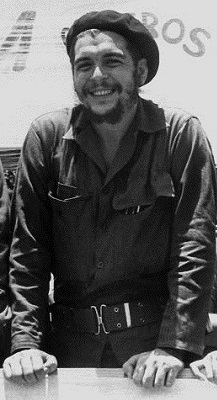|
~ Ernesto Che Guevara
~ Galéria
~ Oldal
~ Bejelentkezés
~ Vissza a Főoldalra
Ernesto Che Guevara, az argentin származású forradalmár, miniszter, gerillavezér és író, Buenos Aires-ben szerzett orvosi diplomát, majd a kubai forradalom során jelentős szerepet játszott a szigetország felszabadításában és újjáépítésében. A kubai gazdaság talpraállításáért dolgozott, küzdött az oktatás és az egészségügy fejlesztéséért, az írástudatlanság és a faji előítéletek felszámolásáért. Saját példájával népszerűsítette az önkéntes munkát. Kongóban és Bolíviában is harcolt - harminckilenc éves volt, amikor az amerikai-bolíviai csapatok csapdába ejtették és kivégezték.
| | |
|

| | |
|
|
|
Cine Cubano presents a documentary about Che Guevara
|
|
|
Commemorating the 86th anniversary of Che Guevara's birthday, En el marco del ciclo de Cine Cubano y videos debate, the Grupo Bariloche de Solidaridad con Cuba (the Bariloche Group of Solidarity with Cuba) and Radio Nacional Bariloche decided to screen a documentary film about the Argentinian revolutionary's life.
The screening takes place on 4th June at 8 p.m.
The 84-minute-long film, titled "Che, un hombre de este mundo" (Che, a man of this world), will be shown in the auditorium of Radio Nacional Bariloche, la Avenida 12 de Octubre 2421.
The organisers described the film of Marcelo Schapces as “a portrait of Che Guevara, built from the voices of all those people who accompanied him in his fight, his life and his ideals. It gives a real dimension to the figure of an extraordinary man, who, after all, was only a man”.
The entry is free.
Source
|
|
|
| | |
|
|
|
~ Ernesto Che Guevara
~ Gallery
~ Site
~ Log in
~ Back to the Main page
Ernesto Che Guevara, the Argentine-born revolutionary, minister, guerrilla leader and writer, received his medical degree in Buenos Aires, then played an essential part in the Cuban Revolution in liberating and rebuilding the country. He did his best to set up the Cuban economy, fought for the improvement of the education and the health system, the elimination of illiteracy and racial prejudice. He promoted voluntary work by his own example. He fought in the Congo and in Bolivia - he was thirty-nine years old, when he was trapped and executed by the joint American-Bolivian forces.
| | |
|
|

